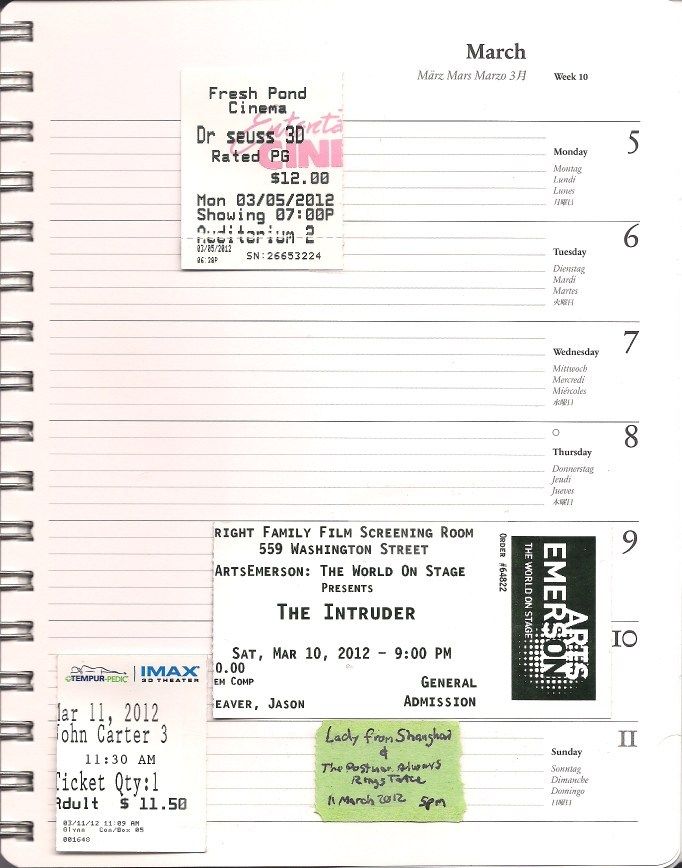
That "John Carter 3" on the ticket looks kind of optimistic, doesn't it?
Not a whole lot I was really jazzed to see this week, to be honest, although the commute is a part of the issue. I've got a sort of reverse commute, where I take the bus from the city to the suburbs every morning and back every night, and lately it's been working out that seeing something at Kendall Square means being there between 6:30 and 7:00pm, which is too early, but I'd have to wait around a half hour or so at Arlington or Somerville. Plus, it's been a quiet couple of weeks; I'm starting to feel like there's not going to be anything really exciting until The Avengers comes out.
At regular theaters, I mean. There's A Life Without Principle this weekend and BUFF the next and IFFBoston after that... And some good old stuff if you know where to look.
The Intruder
* * * ¼ (out of four)
Seen 10 March 2012 in the Paramount Theater Bright Family Screening Room (Crazie for Cult, 35mm)
Well, looky here, William Shatner in a Roger Corman movie. And it's not just some goofy sci-fi/horror thing; it's a principled drama about school integration that may just be Shatner's best role. He plays a member of the "Patrick Henry Society" who comes to Caxford, Missouri in the days before its high school is set to be integrated to make sure that there's an ugly enough scene to set the civil rights movement back nationally.
Shot on the cheap, with Corman and cinematographer Taylor Byars actually getting some shots done guerrilla-style after the locals got wind of what the movie was about and they were kicked out of town, it's got a lot of the same energy as Corman's exploitation films, putting the racism and violence in the audience's face and not caring about "subtle" one whit. This sort of racism is the province of ignorant monsters, say Corman and writer Charles Beaumont, and it's a shame that enlightenment is seldom spontaneous, but the result of having the violence right in your face.
Corman and Beaumont sometimes have a little trouble getting that precise message across, and the heavy-handedness (especially with the music) can be a little much, but, you know, good on this guy who made no bones about seeing film as a business being willing to put an unpopular opinion right out there.
The Lady from Shanghai
* * * ½ (out of four)
Seen 11 March 2012 in the Brattle Theatre (Film Noir Weekend, 35mm)
Orson Welles and Rita Hayworth, ladies and gentlemen. It's almost all you have to say here, because while the film noir plot is pretty basic - man falls for beautiful woman above his station, she demonstrates that her life's not perfect, but before they can run away together, there's a little murder that must be done - but it's the way they execute it that makes it memorable.
And when you get right down to it, the way writer/director/producer/star Welles and company play The Lady from Shanghai out is kind of loopy: Welles's narration is equal parts broad Irish accent and tough-guy dialogue, George Grisby is way over-the-top as the lawyer looking to fake his death so that he can run away from his fears of nuclear annihilation, and the final showdown in an abandoned amusement park is equal parts absurd slapstick and artsy cinematography. Welles is dead serious about things that would today be played as parody.
Plus, Rita Hayworth. Good gravy, is she beautiful in this movie, playing the sort of woman who is so beguiling that, even as Welles's Michael O'Hara and the audience realize that he is slipping into a mire from which there may be no escape, it's hard to think that it's the result of anything but a man's own nature - women like this just can't help but leave a string of wrecked men in their wake.
The Postman Always Rings Twice (1946)
* * ¾ (out of four)
Seen 11 March 2012 in the Brattle Theatre (Film Noir Weekend, 35mm)
I'm not sure whether this movie makes a good double feature with The Lady Shanghai or not, seeing how similar their templates are: Vagabond, married blonde, murder, bizarre trial, finale. It's at least instructive to see what Welles, a genius, is able to do with the material versus the merely solid crew here.
It's not a bad movie, by any means - Lana Turner and John Garfield are well-cast as the girl with the inconvenient husband and the drifter who falls for her, and get a load of Hume Cronyn as the lawyer who is so gleefully corrupt that he would wind up dominating the average episode of Law & Order. It just frequently seems to take forever: Its nearly-two-hour runtime is quite long for 1946, and during the first half, one does find oneself wishing that they would just kill Cora's husband already. Some of the standards of the day are kind of hilarious, as well: Cora and Frank continuing to live under one roof (though in separate rooms) after Nick dies is apparently not just suspicious, but criminal, while Nick habitually driving while cartoonishly inebriated is apparently sort of goofy.
It's not bad, though - for all its faults, it quite frequently plays as more than the sum of its parts.
No comments:
Post a Comment